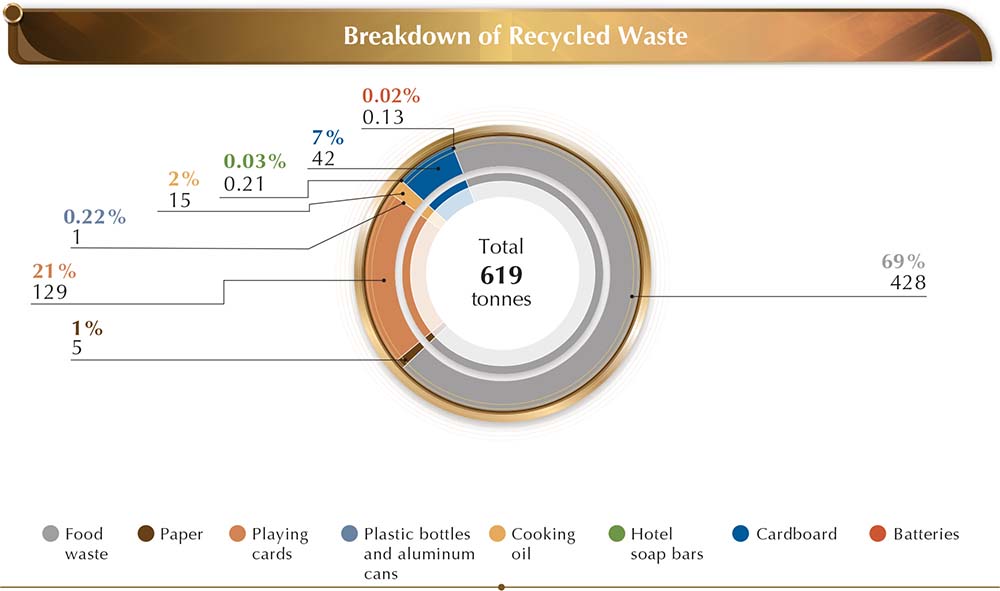
 中文
中文

PROTECTING OUR ENVIRONMENT
At NagaWorld, we recognise that environmental risks are also business risks. Climate change has direct and knock-on socio-economic effects on the tourism industry, our operations, our supply chain, and key stakeholders. We are also cognisant that our aspirations for improved environmental performance entail a delicate balance with providing top-notch hospitality experiences for our guests.
In advancing our environmental commitments, we review our operations and value chain to align with our environmental goals. It involves adopting industry best practices, encouraging our workforce to minimise resource use and reporting our environmental performance. For instance, the Sustainability Steering Committee and heads of departments, receive monthly environmental performance reports.
Since 2023, we established 2030 environmental targets, and issued an Environmental Policy as a guiding framework for managing our environmental impacts. The Environmental Policy communicates our commitment, principles and governance to conduct our business responsibly and minimise environmental impacts. To view our Environmental Policy, click here.
Environmental Advocacy
Our advocacy for protecting the environment is focused on our staff and guests. With our staff, we build capacity through the annual environmental awareness online training, and the Green, Health and Safety Campaign. Visual aids such as environmental posters encouraging the use of hand dryers in restrooms and food waste segregation posters at the staff cafeterias help to reinforce eco-friendly behaviour. Through NagaWorld Kind Hearts, our CSR arm, we regularly organise volunteer activities for our staff to support local communities in maintaining a clean and green environment. For guests, our long running “Plastic Straw Free” initiative and towel and linen reuse programme has helped to reduce plastic waste and water consumption.
At the national level, we continue to foster cross-sector partnerships by actively working alongside the RGC, NGOs, and the Cambodian business community to promote green initiatives and raise environmental awareness. In 2024, we participated in a multi-stakeholder validation workshop on single-use plastics organised by the Ministry of Environment and the UN Development Programme Cambodia.
Environmental Targets
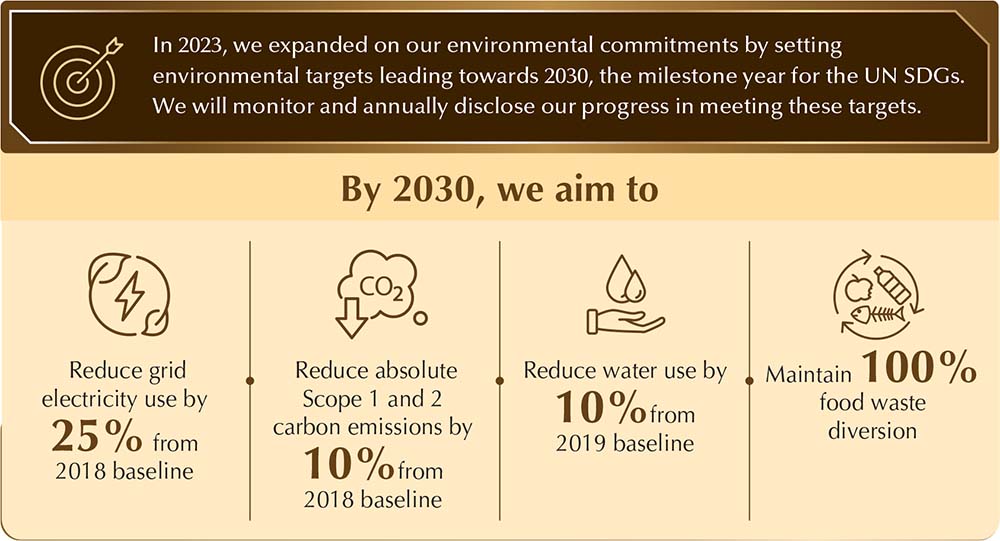
Environmental Performance
1. GHG Management
In 2024, our total Scope 1 and 2 GHG emissions increased by 2.4% compared to 2023. The increase was due to the new disclosure of Scope 1 GHG emissions from fire suppressants in 2024. Otherwise, a 1% reduction in Scope 1 and 2 GHG emissions would have been recorded. Against a backdrop of improved business volumes during the Year, there were increased usage of Liquefied Petroleum Gas (“LPG”) in kitchens and vehicle fuel use. We managed to decrease refrigerant use and maintained similar electricity usage as 2023. Our energy reduction initiatives continued to lower energy consumption and GHG emissions.
Compared to our 2030 target to reduce Scope 1 and 2 GHG emissions by 10% from our 2018 baseline, 2024’s Scope 1 and 2 GHG emissions reduced by 2%. As part of our ongoing evaluation, we will continue identifying opportunities to lower our carbon footprint.
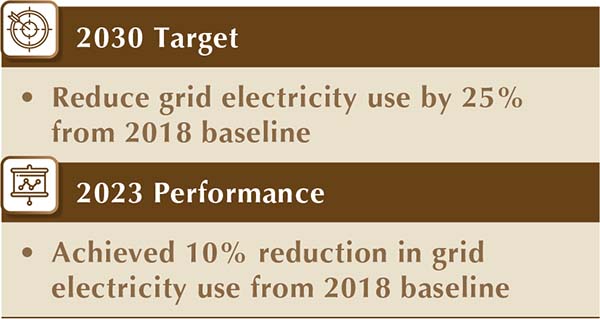
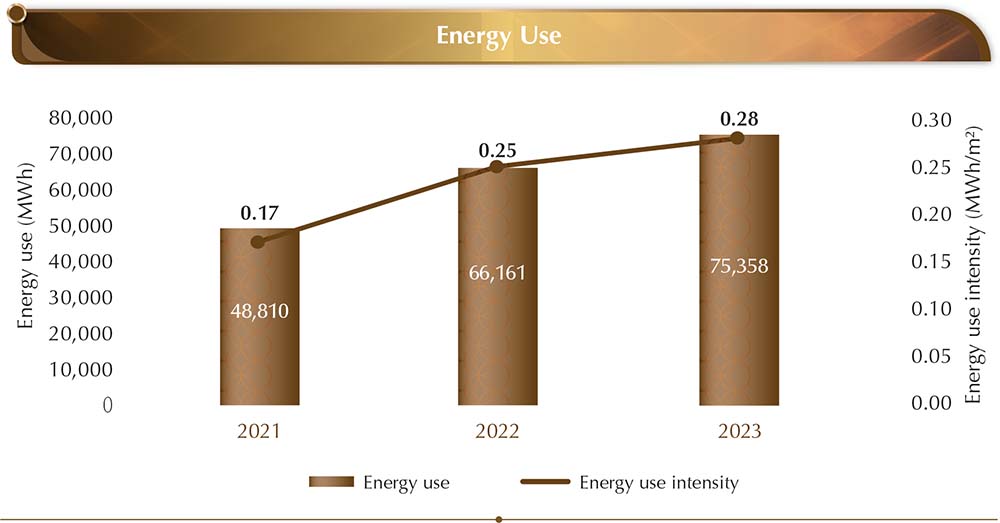
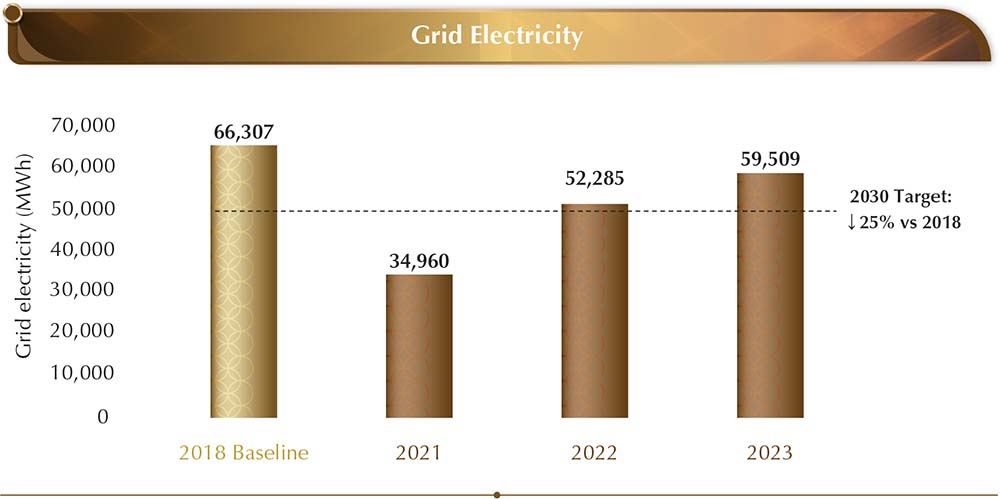
Notes:
| (1) | Due to changes to our GHG accounting in 2024, adjustments to Scope 1 GHG emissions were made, including retrospective adjustments to the Scope 1 and 2 GHG emissions for 2018 baseline, 2022 and 2023. |
1.1 GHG Emissions Reduction Initiatives
Reducing energy usage and refrigerant loss are our core focus in lowering our GHG emissions. We monitor the hotel occupancy levels and human traffic on our premises, adapt the operating hours of our building systems and perform preventive maintenance. Our energy reduction initiatives targeting lighting and cooling have consistently contributed to reducing GHG emissions. Since 2016, we have avoided at least 986 tonnes CO2e from these initiatives.
1.2 Climate Action Plan
With rising global warming, world temperatures have set new record highs over the last few years. 2024 was the hottest year on record, and the average global temperature exceeded 1.5°C above pre-industrial level for the first time, crossing the threshold set by the Paris Agreement (Source: World Meteorological Organization, 10 January 2025). In Cambodia, increasing climate-related risks from exposure to extreme weather events remain a national concern. Climate projections indicate that 9.8% of Cambodia’s GDP is at risk by 2050 under a 2°C warming scenario by 2100, and current levels of climate adaptation investments (Source: Khmer Times, 10 October 2024). Relevant to the hospitality industry, the growing frequency and intensities of extreme weather events have influenced how travellers choose their travel destinations (Source: World Sustainable Hospitality Alliance, November 2024).
To attain our environmental goals, our climate action plan encompasses ongoing, near- and long-term initiatives. We anticipate the continuous refinement of our climate action plan over time, as green solutions become more accessible and climate awareness in our value chain improves.
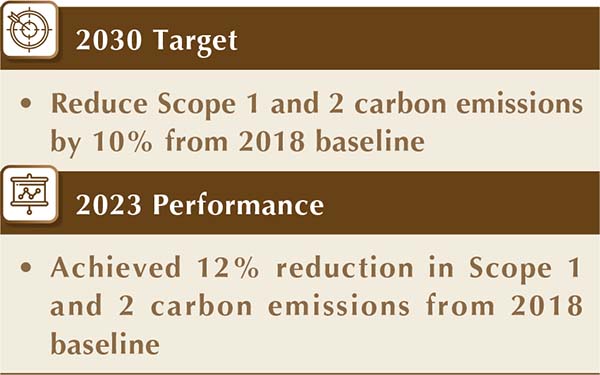
2. Energy Use
Our electricity is supplied by the Phnom Penh city grid, Electricite Du Cambodge (“EDC”). EDC’s grid energy mix comprises hydropower, coal, fuel oil, biomass, solar energy, and imported energy from the region. In 2024, more than half of Cambodia’s energy supply was generated from renewable energy, placing Cambodia on track to achieve its climate goal of 70% renewable energy share by 2030 (Source: Khmer Times, 22 November 2024). Besides grid electricity, we consume from other energy sources such as diesel to operate backup generators and hot water boilers, and LPG for cooking.
In support of global climate action and Cambodia’s climate goals, in 2023, we are committed to reducing grid electricity use by 25% by 2030 from our 2018 baseline, aligning with Cambodia’s National Energy Efficiency Policy for commercial buildings.
In 2024, our total energy consumption rose slightly by 1% compared to 2023. The increase was primarily due to higher LPG usage in the kitchens and fuel usage from vehicles, reflecting the increased business volumes in 2024. Compared to our 2030 target to reduce electricity use by 25% from our 2018 baseline, 2024’s electricity used was 10% lower.
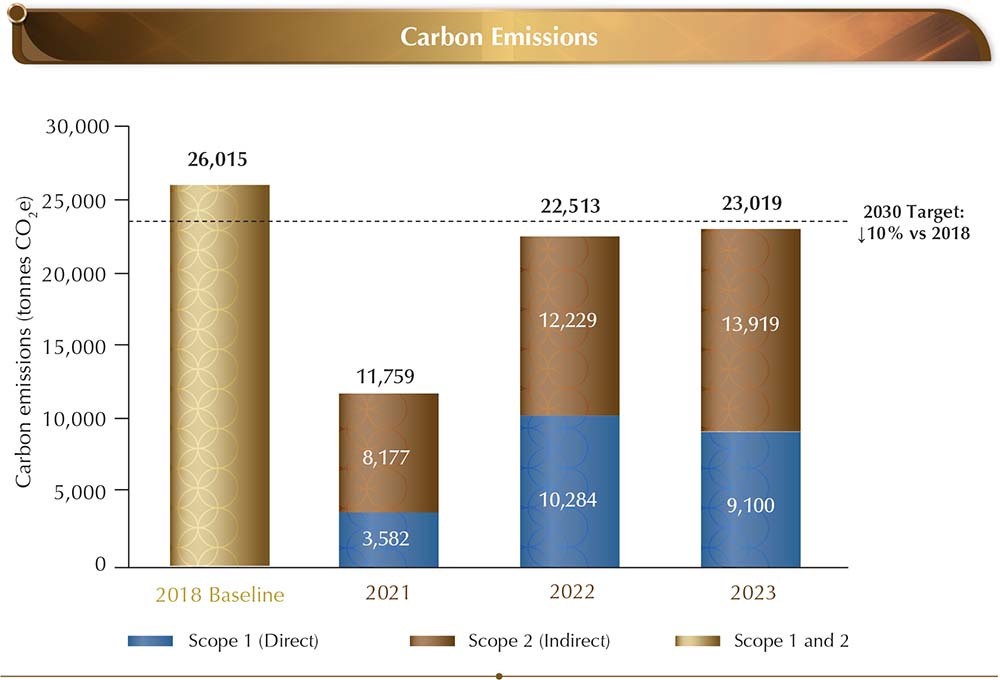
2.1 Energy Reduction Initiatives
As a 24/7 establishment, we consume more energy than conventional commercial buildings. In reducing our energy consumption, our initiatives at the NagaWorld integrated resort complex include
- Installing LED lights
- Removing unnecessary indoor lighting
- Maintaining 27°C on non-operational hotel floors
- Installing isolator switches to reduce the operational hours of the kitchens’ motor exhaust fans
- Replacing the exhaust fan motor and control panel with variable speed drive
- Adjusting the operational hours of lights, chillers, chilled water pumps, AHUs, walkway fan coil units, boilers, and cooling tower operations according to human traffic at the front-of-house and back-of-house
Our hotel rooms and housekeeping protocols are designed to save energy
- Hotel rooms are fitted with card-activated power switches
- Standard room temperature is set at 23°C
- Daytime room cleanings utilise natural lighting
- Keeping curtains closed to reduce cooling loss in unoccupied hotel rooms
Since 2016, we have accumulated at least 4,217 MWh and US$668,000 in energy savings through the energy-saving initiatives implemented at the NagaWorld integrated resort complex.
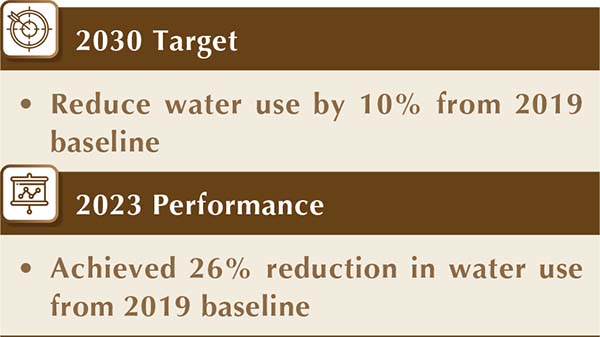 |
Installation of double-glazed windows in guest rooms of Naga 1 main wing Expected impact: Improved thermal insulation in hotel rooms and corridors, resulting in lower cooling needs and energy used |
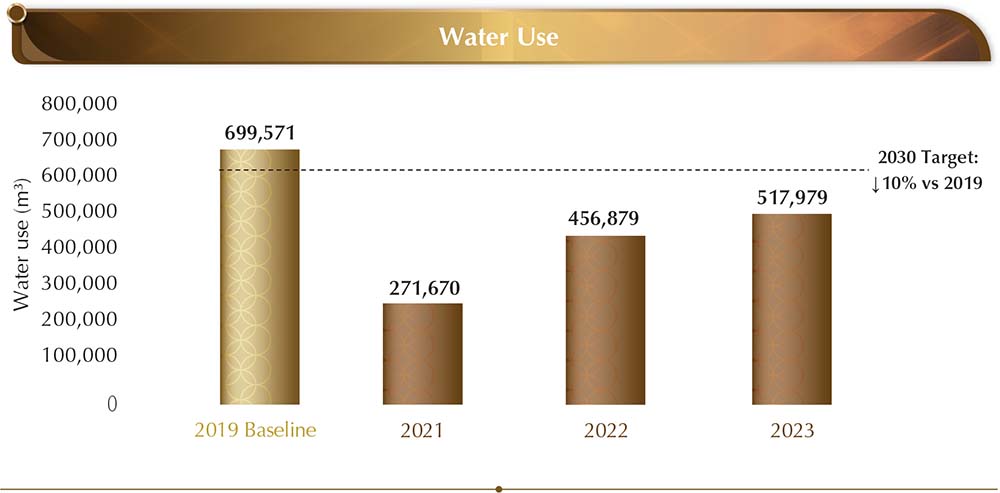 |
Commenced an energy audit for Naga 2 Expected impact: Improved understanding of Naga 2’s significant energy uses, leading to future implementation of energy saving measures |
3. Air Quality
For the comfort of our building users, we implemented monitoring and preventive measures to manage indoor air quality. It includes inspecting and deep cleaning AHUs and furnishing common areas with plants to boost greenery and air quality.
In managing vehicular emissions, we routinely schedule maintenance checks for our fleet based on the vehicle mileage. Our drivers also adopt environmentally friendly practices that reduce tailpipe emissions and save fuel.
- Turning off engines when waiting for guests
- Reducing idle vehicle emissions by dispatching to the pickup point only when guests are ready for departure
- Checking traffic conditions to avoid traffic jams
4. Water Use
Our water is supplied by the Phnom Penh Water Supply Authority (“PPWSA”). The treated freshwater from PPWSA complies with the drinking water standards of the World Health Organization and national drinking water standards.
During the Year, our water consumption increased by 4% compared to 2023 due to increased business volumes. Compared with our 2030 target to achieve a 10% water use reduction against our 2019 baseline, we achieved a 23% reduction in 2024.
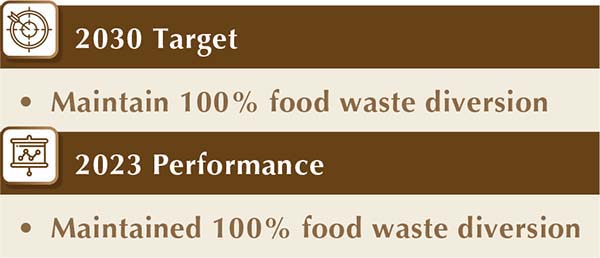
4.1 Water Conservation Initiatives
We incorporate water conservation features and practices into our building design and maintenance.
- Water-saving toilets and showers in hotel rooms
- Automatic sensor faucets at Naga 2’s public area restrooms
- Regular inspections and maintenance of hotel rooms
- Training employees on water management during cleaning
- Preventive maintenance for air conditioning filters, fan coil units and AHU coil cleaning
- Using native plants in landscaping
We also educate our guests and employees on the importance of saving water through environmental messages in the hotel rooms and the restrooms in public areas and offices. Our towel and linen reuse programme in hotel rooms allows guests to choose a more sustainable stay by not changing bed linens and bath towels daily.
At Central Laundry, we utilise water-efficient front-loading washers and tunnel washers. The patented PulseFlow® Technology reduces the tunnel washer’s water usage by 50% by reusing the final rinse water for the next pre-washing cycle.
5. Waste and Effluent Management
In managing our waste, we embrace the 5Rs waste management hierarchy – Reduce, Reuse, Recycle, Refuse and Remind. The 5Rs approach helps us to steer towards minimising resource use and maximising resource recovery. As we are primarily a service business, we do not produce material amounts of hazardous waste or significant packaging waste. At the minimum, we comply with Cambodia’s law on waste management, namely the Sub-decree on Solid Waste Management.
Overall, the total waste generated in 2024 increased by 5% compared to 2023 due to increased business activities. Recycled waste saw an increase of 14%, while non-recycled waste increased by 3%. In diverting waste from the landfill, we achieved a waste diversion rate of 21%, an improvement from 2023’s 19%.
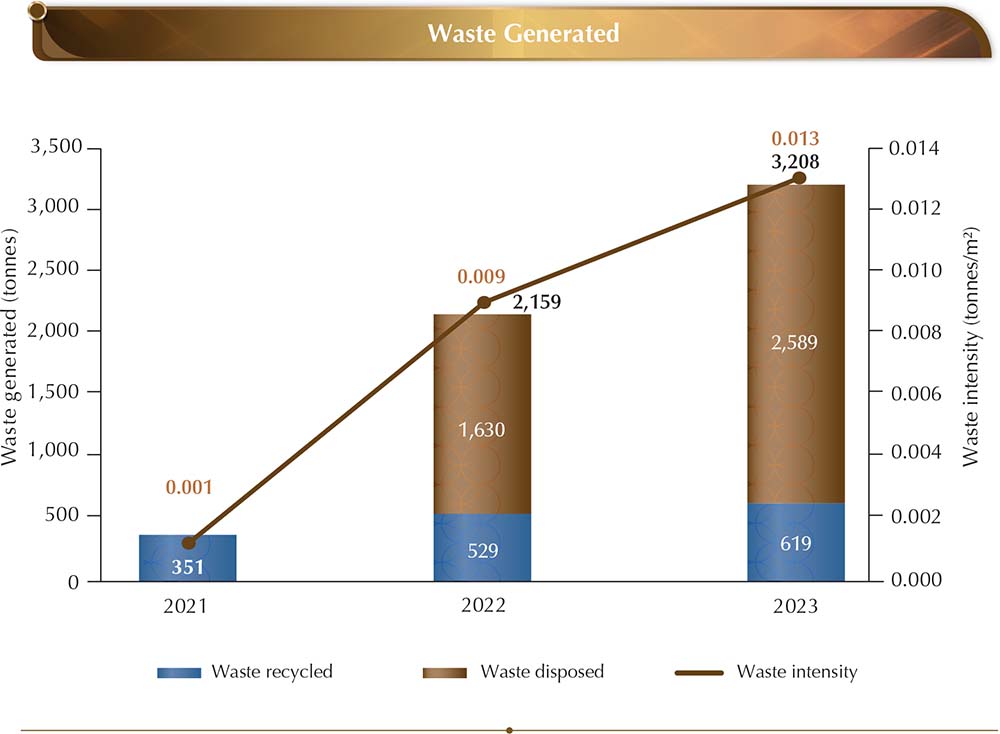
5.1 Waste Management Initiatives
The waste management hierarchy guides our waste management strategy. It prioritises waste prevention at the source and discourages disposal to the landfill. We aim to recycle as far as possible for waste we cannot reduce further.
